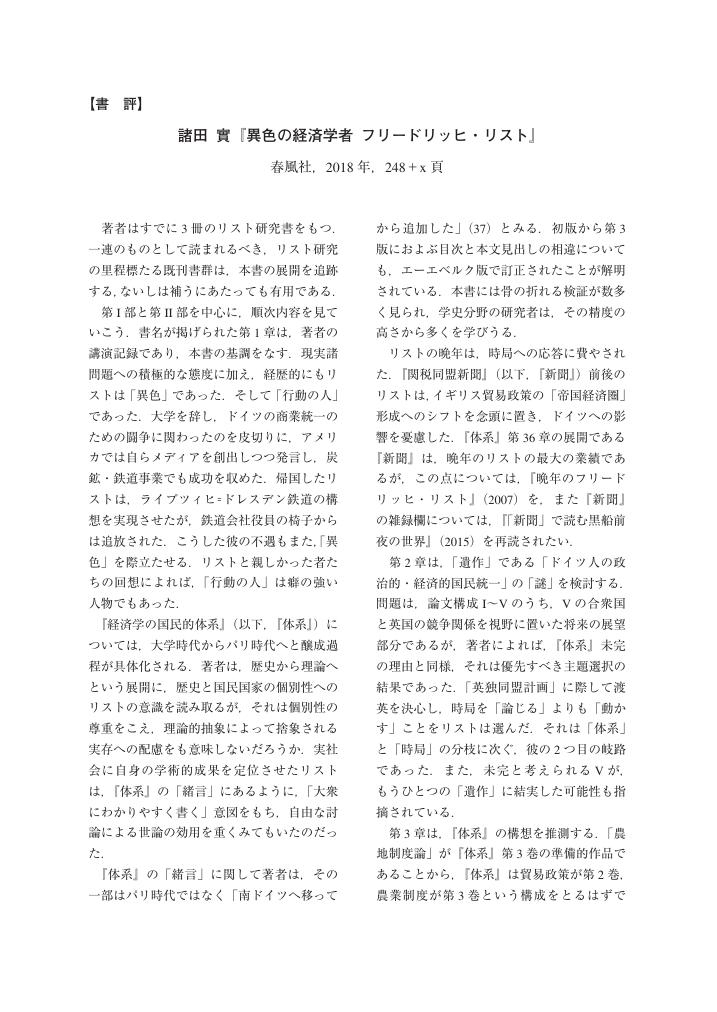1 0 0 0 OA 諸田實『異色の経済学者 フリードリッヒ・リスト』春風社,2018年,248+x 頁
- 著者
- 大塚 雄太
- 出版者
- 経済学史学会
- 雑誌
- 経済学史研究 (ISSN:18803164)
- 巻号頁・発行日
- vol.61, no.2, pp.94-95, 2020 (Released:2020-02-29)
1 0 0 0 OA 高柳良治『ヘーゲルの社会経済思想』こぶし書房,2015年,236頁
- 著者
- 大塚 雄太
- 出版者
- 経済学史学会
- 雑誌
- 経済学史研究 (ISSN:18803164)
- 巻号頁・発行日
- vol.58, no.2, pp.76-79, 2017 (Released:2019-11-30)
- 著者
- 大塚 雄太
- 出版者
- 経済学史学会
- 雑誌
- 経済学史研究 (ISSN:18803164)
- 巻号頁・発行日
- vol.57, no.2, pp.126-127, 2016 (Released:2019-11-26)
1 0 0 0 OA ファーガスンからスミスへ 「注釈」にみる初期ガルヴェの道徳哲学
- 著者
- 大塚 雄太
- 出版者
- 経済学史学会
- 雑誌
- 経済学史研究 (ISSN:18803164)
- 巻号頁・発行日
- vol.57, no.1, pp.51-72, 2015 (Released:2019-08-27)
Abstract: This paper clarifies the story of Christian Garveʼs annotation (Anmerkungen des Ueberset-zers), which was attached to his translation into German of Adam Fergusonʼs Institutes of Moral Philosophy. Previous studies have indicated the importance of the annotation in light of Schiller and Hegel having read it while young, but few studies refer to its content. Garve has always been compared with famous philosophers rather than considered as a thinker in his own right. This paper, however, treats his annotation not as a mere explanation of an orig-inal text, but as revealing Garve's own moral philosophy. Without the annotation, the spread of Institutes in Germany would have been considerably diminished. Garveʼs annotation has several features. First, he places the utmost importance on the in-dependence of human action. Human beings should strive for moral perfection. The discus-sion on the distinction between humans and animals is symbolic of this matter. Second, Garve interprets carefully the difference of the meaning of words in German and English. This interpretation reveals that, as an Enlightenment philosopher, he was conscious of his readers. Third, the annotation shows the influence of Adam Smith's moral philosophy. We can find this in the discussion on “public repute” and “human right.” Fourth, like Ferguson, Garve thinks that human progress towards moral perfection is supported by the goodness of God. The most essential feature is the first one. The main context for Garve's moral philoso-phy is the description of human progress towards moral perfection. This accounts for the im-pression it made on the young Schiller. The third point is also very important, however, be-cause it hints at the direction of Garve's career, which extends to the translation of Smithʼs Wealth of Nations. JEL classification numbers: B12, B31.
- 著者
- 大塚 雄太 OTSUKA Yuta
- 出版者
- 名古屋大学大学院経済学研究科
- 雑誌
- 経済科学 (ISSN:00229725)
- 巻号頁・発行日
- vol.62, no.4, pp.61-75, 2015-03
This paper focuses on the later thought of Justus Möser (1720-1794) and its meaning in the social context of the eighteenth century. Through our investigation, we discover a practical intention in his thought and unearth his original position in the modern German history of ideas. Generally, though especially in Japan, the modern German history of ideas is a genealogy of renowned philosophers, including Kant, Fichte, and Hegel; few places are reserved for Möser. However, the modern German history of ideas is far more complex than the history of philosophy allows, because it developed during social upheaval, particularly the French Revolution. Discussions concerning theory and practice show the relation between societal trends and thought. Kant's paper was the epicenter of such discussions in the late eighteenth century, drawing responses from many thinkers, including Möser, who wrote his theory and practice from a critical viewpoint of Kant's theoretical and abstract argument. We clarify Möser's concrete logic in his historicism, which is based on facts from society and history, and contrast it with Kant's argument. Beyond traditional evaluations of Möser as a conservative or a political romanticist, this paper portrays him as an Enlightenment thinker for society.
- 著者
- 大塚 雄太
- 出版者
- 藤原書店
- 雑誌
- 社会思想史研究 (ISSN:03864510)
- 巻号頁・発行日
- no.32, pp.78-93, 2008


